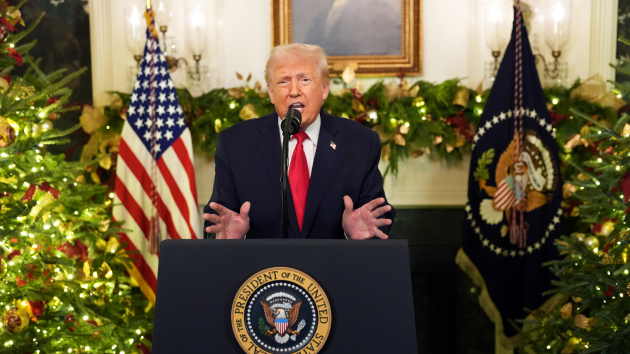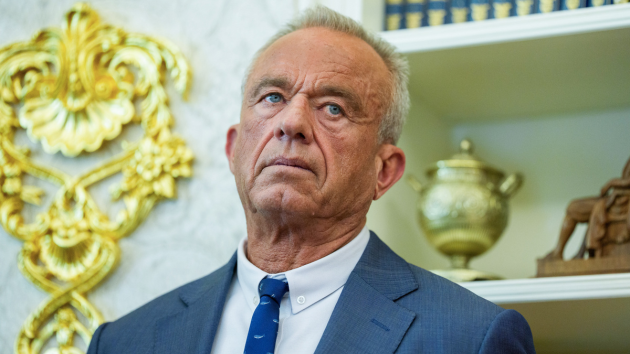Elon Musk’s first 30 days: How DOGE is reshaping the federal government
Written by ABC Audio. All rights reserved. on February 25, 2025
(WASHINGTON) — Elon Musk is the world’s richest man. He’s revolutionized electric cars as CEO of Tesla, launched rockets as head of SpaceX and seized control of a social media platform by buying Twitter for $44 billion.
The South African-born businessman spent $270 million to help President Donald Trump get reelected. When Trump returned to office on Jan. 20, he empowered Musk to slash federal spending and make key decisions about the future of the U.S. as a lead adviser in the newly created Department of Government Efficiency (DOGE).
The following day, the Office of Personnel Management — which acts as the government’s human resources department — directed agencies to compile a list of workers whose positions could be eliminated.
By Jan. 22, there was a federal hiring freeze. All agencies were directed to put diversity, equity and inclusion (DEI) staff on leave, related programs were shuttered and employees were ordered to remove pronouns from their signatures.
The next several days set off confusion and panic for many workers across the country. A federal funding freeze briefly denied Head Start — free early childhood development programs designed to help low-income households — access to funding on Jan. 27, despite a federal judge’s court order to the contrary.
Then, on Jan. 28, some 2 million federal workers received an email with an offer to resign and be paid through September or risk being fired. The email subject line “Fork in the road” mirrored the language Musk used when he slashed Twitter’s workforce in 2022.
Within 30 days, DOGE gained access to personal information of millions of Americans through at least 15 federal agencies. Much of Musk’s staff consisted of young engineers who moved into the Eisenhower Executive Office Building.
Musk initially wanted an office in the West Wing, but told people he thought what he was given was too small, multiple people familiar with his comments told ABC News earlier this month.
Only Congress has the power to eliminate entire agencies, but Musk and his team proved they can still be stripped down when they went into the U.S. Agency for International Development (USAID).
“DOGE was in the building. We took down our Pride flags,” USAID contractor Kristina Drye told ABC News on Feb. 3. “I took out any books I felt would be incriminating. No one was talking.”
At the same time, Consumer Financial Protection Bureau (CFPB) workers were told to stay home — its headquarters closed and all work stopped. The consumer watchdog was created after the 2008 financial crisis and housing crash to protect American families from unfair and deceptive practices.
Around 75,000 workers took the Trump administration’s offer to resign, according to the White House. However, some people — like Kansas-based Department of Agriculture natural resource specialist Nick Detter — say they accepted within the timeframe and were fired anyway. The administration acknowledged that this has happened by mistake.
“I would never say that there’s no room for improvement, efficiency in the federal government,” Detter told ABC News. “But in my experience over the last month with this whole thing, that’s not what this has been.”
After the buyout offer closed, many federal workers said they started receiving emails and calls informing them that they were fired. Justine Beaulieu, who worked for the Department of Agriculture until last week, said she was among them.
“I was three days away from my due date on Friday when I got that termination letter. And I had my baby yesterday, right on time,” she told ABC News. “Paid maternity leave is off the table, and my health insurance is set to lapse at the end of this month.”
The administration has been reversing course in some cases, working to rehire the workers who manage the country’s nuclear weapons and the inspection officers who worked on containing the bird flu outbreak.
Musk has been designated as a special government employee. His companies Tesla and SpaceX have been awarded $18 billion in federal contracts over the last decade. Some of this money has come from agencies the president asked Musk to review, but Musk dismissed the notion that there could be conflicts of interest.
“No, because you have to look at the individual contract and say, first of all, I’m not the one, you know, filing the contract — it’s people at SpaceX,” he told ABC News on Feb. 11.
On the same day, Trump assured ABC News any possible conflicts of interest would be addressed.
“If we thought that, we would not let him do that segment or look in that area, if we thought there was a lack of transparency or a conflict of interest,” the president said.
Trump has fired independent watchdogs like Defense Department Inspector General Robert Storch.
“When you just wholesale fire people like that without giving any reasons for doing it, it sends a message that that sort of oversight, that productive oversight, isn’t really valued,” Storch told ABC News on Feb. 12.
The total savings DOGE has made so far is still unclear, but the group’s work has already set the stage for one of the biggest modern shakeups of the federal government.
Copyright © 2025, ABC Audio. All rights reserved.





